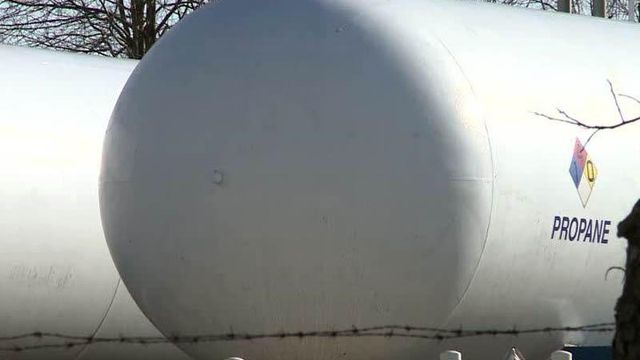Audit: NC agency rarely fined gas rules violators
A state agency responsible for checking the safety of propane and other liquefied petroleum gas facilities rarely fined operators even when they repeatedly violated regulations, according to an audit released Thursday.
Posted — UpdatedInspectors for the standards division of the state Department of Agriculture and Consumer Services found 7,466 violations representing potential threats to public health and safety in the year after October 2009, when the agency was authorized to impose stiffer civil penalties, the audit by State Auditor Beth Wood's office found. LP gas can burn or explode if it comes in contact with a spark.
The violations were at facilities where propane is stored and sold, from tank farms and home heating companies to grocery stores.
They included nearly 200 cases in which emergency shut-off valves didn't work, the report said. Other violations included gas storage plants that were not locked when unattended, leaks around tanks and pipes, and documentation deficiencies, the report said. Nearly 10 percent of the violations were repeat discoveries of problems that hadn't been fixed, with some operators having as many as seven repeat violations.
"There were remote shut-off valves that weren’t working – 178 of those violations were shut-off valves that weren’t working. You have pipes that were leaking. These are not just, 'I don’t have a no-smoking sign posted.' Some of these – a lot of these – were extremely serious," Wood said.
The Agriculture Department could have assessed fines of up to $2.5 million for those violations. About 80 percent of fines collected go to public education.
"(Schools) could have used $2 million dollars this year, and you multiply that over several years," Wood said.
Instead, just two facilities were fined, totaling $7,100, the report said. State auditors said those fines were negotiated down to $4,000.
The Agriculture Department said in a response it assessed few penalties because its database was incapable of tracking violations, and without the database it risked inconsistent treatment of companies being fined different amounts for similar violations.
"They didn't have any way to track what they charged or what they did for the companies with the same violation, so they didn't do anything," Wood said.
It's unclear why no system was in place. The LP-Gas Section had been given the power to fine violators in the summer of 2009. One person in the office - supervising LP-Gas Engineer Richard Fredenburg - was in charge of reviewing violations and deciding what fines should be imposed. Standards Division Director Stephen Benjamin was required to sign off on the fines.
Department of Agriculture officials declined to make Fredenburg or Benjamin available for an on-camera interview. But Benjamin told auditors that besides being regulators, the Agriculture Department sees its job as educating those it inspects and suggesting solutions to their problems. The department is more concerned with getting companies in compliance with regulations than punishing them for violations, Benjamin said in an interview with The Associated Press.
The report by Wood's office rejected that view.
"Based on the volume of repeat violations at LP-gas facilities, the department's expectation of voluntary compliance with respect to repairs or corrective action has been ineffective," the audit report said. "Thus, the threat to public health and safety continues and directly conflicts with the department's mission to protect consumers."
Besides allowing some propane companies to violate regulations without penalty while others spent the money needed to comply, "Standards Division inspectors said that low morale was prevalent because management did not assess penalties for repeat violations," the report said.
A complaint from the public triggered the review of the state agriculture agency's LP gas program, the audit report said.
In a response letter accompanying the audit report, Agriculture Commissioner Steve Troxler said the $2.5 million figure for potential fines totaled the maximum penalty on all violations, though state law allows the commissioner to consider the extent of potential harm.
"The wording of the statute would seem to preclude the imposition of the maximum penalty for all violations," said Troxler, who is a Republican. Wood is a Democrat.
The database and a schedule aligning violations with penalties became effective for inspections of bulk storage plants in September, and since then seven civil penalties have been issued, the agency said. Other types of facilities will be added to the database in the future, the agency said.
The executive director of the North Carolina Propane Gas Association declined to comment on the report.
• Credits
Copyright 2024 by WRAL.com and the Associated Press. All rights reserved. This material may not be published, broadcast, rewritten or redistributed.





